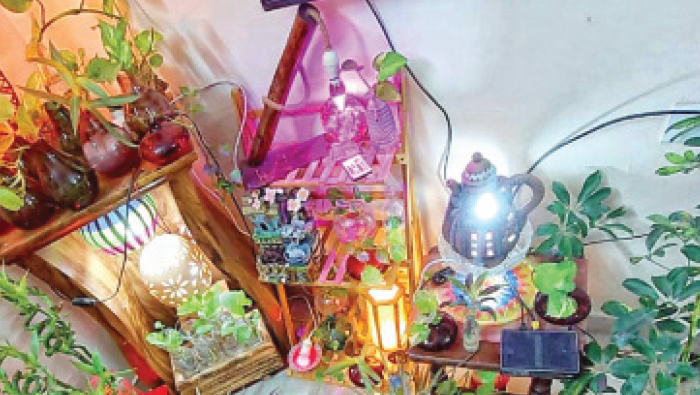
Muscat: A plant scientist living in Oman has found out that plants have a great way of keeping away the negative emotions associated with COVID-19, and the other impacts related to the disease.
Research done during the peak of the pandemic by Dr Priyanka Verma, a botanist who has more than 15 years’ experience with medicinal plants and how they can be grown without soil, has revealed that plants could break the monotony of social distancing and increased isolation brought about by COVID.
“It is a well-known fact that the pandemic did bring with it a lot of isolation stress, fear and anxiety that made us look at it as more than just a disease,” she said. “Some people became highly pessimistic regarding the recovery of individuals and societies. The stress brought about by the pandemic can be considered to be at par with thinking continuously about meeting with an accident while driving, rather than just enjoying the journey.
“Overall, the stresses of the disease, coupled with loneliness brought about by COVID, made COVID-19 much more difficult to handle for many,” she added. “People were exposed to a lot of negativity. Here comes the role of plants: they first break the monotony and distract your mind from negativity. They soothe the mind and keep you busy, while encouraging you to observe renewal and life…a great sign of positivity. Even a bud growing from a dying plant can give you the strength and belief to appreciate life.”
A PhD in botany from the Council of Scientific and Industrial Research (CSIR) in India, Verma did her post-doctoral work as a scientist with the Science and Engineering Research Board (SERB) under the Department of Science and Technology of the Government of India.
The body was set up to encourage more research in science and engineering, provide financial assistance to scientists, academic institutions and R&D laboratories, and to award fellowships for advanced research and innovation.
Verma was invited in 2021 to travel to France for a year, to conduct research under Le Studium Fellowship, a research initiative organised by the Loire Valley Institute for Advanced Studies. However, the pandemic meant she could not move there. Having lived in Sur since 2018, Verma has used the time during the pandemic to further her knowledge on the therapeutic and psychological impact plants can have on people.
Better still, she has been able to find out which plants thrive better in arid conditions, thereby enabling more people in Oman and other Arab countries to benefit from her research. She is now looking for more opportunities in the country that will enable her to take up formal research and lecturing.
“As COVID-19 has strongly impacted our lives, I realise that plants could be connected to better recovery. I strongly believe that hospitals, clinics and rehab centres can include growing and cultivating plants as part of their recovery. They have direct positive impact on patients’ attitude towards life, which gives them the strength to fight back.
“Even taking care of a single plant is enough to boost your energy,” she revealed. “I have allotted one plant to my four-year-old daughter for watering. She is so excited to see its growth and the emergency of new leaves. Similarly, I shared some plants with my friends. They are so excited to share their growth updates and nutrition requirements with me.”
Keen on bringing plants into her Sur home to generate positive vibes even before the pandemic began, Verma first began growing ornamental plants bought from nurseries in the area, but they soon died because of the challenging environmental conditions brought about by the heat and sandy soil.
She slowly came to know about their limitations, and instead switched to growing plants that could withstand high temperatures and thrive and desert-like conditions. She used her botany expertise to make homemade fertilisers, and provided them with water recycled from her kitchen chores to reduce costs and make her efforts more sustainable.
“After coming to my home, people experience the positive impact the plants have had on them, and have begun seeking my advice to build their home gardens,” said Verma. “It’s not just here in Oman, but my Indian friends who also felt the mental impact of COVID who are now excited to raise plants in their homes.”